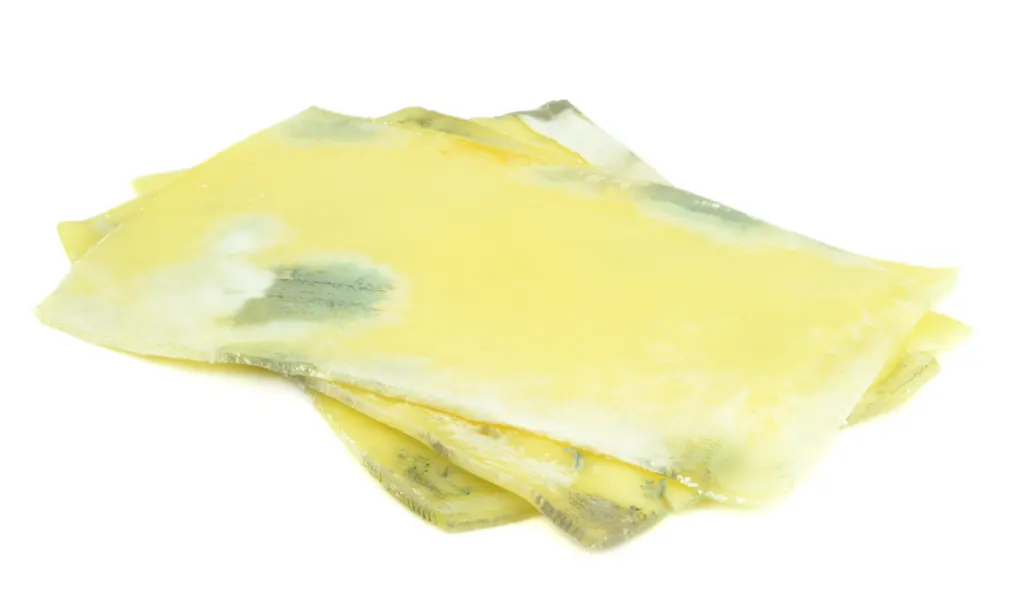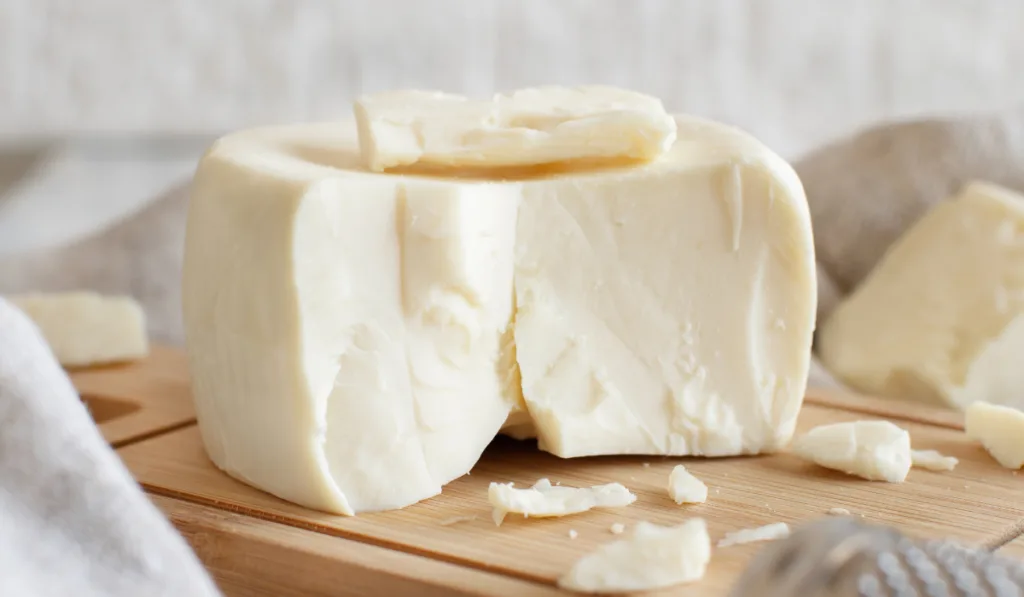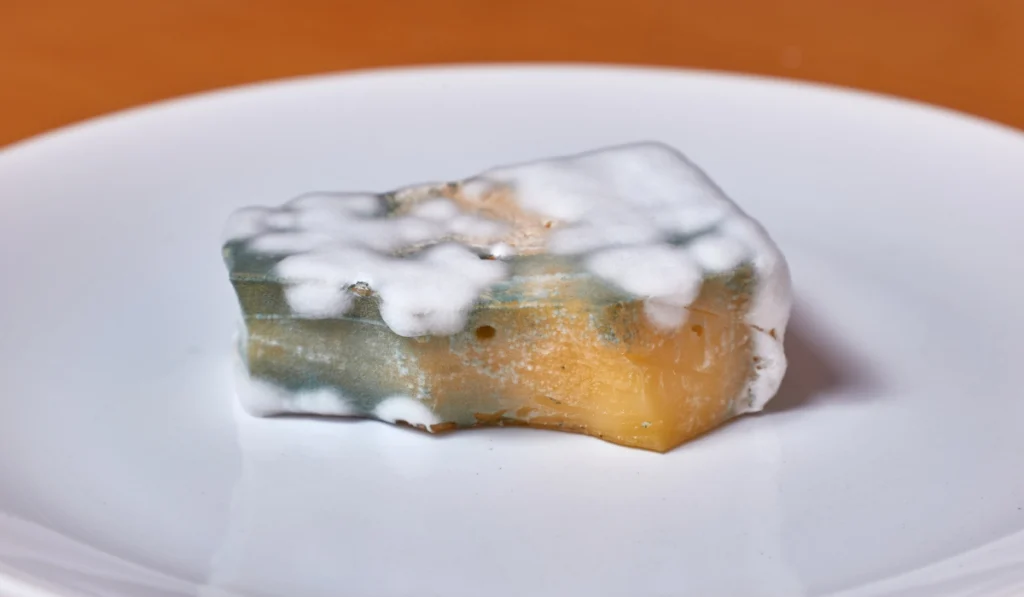People always think it’s tricky to tell if cheese is rotten. After all, cheese is a byproduct of the fermentation process. Some cheeses are famous for their moldy streaks, like blue cheese. Other types of cheese have intense, pungent odors that people love to eat with crackers or as appetizers.
How can you tell if cheese is bad?
It’s easier to tell when cheese goes bad when you’re dealing with familiar cheeses. Cheddar, for example, is easy to spot because it doesn’t usually have mold. If a cheese starts to decay, changes colors, or smells foul (or fouler than it’s supposed to), it’s probably past the point where you want to eat it.
Some cheeses are meant to be funky, others, not so much. Learning how to tell when a piece of cheese is fresh and when it’s rotten will help you avoid eating something that will make you sick.
Here are some tips on how to tell if cheese is bad and ways you can store cheese to make it last longer.

Table of Contents
Knowing When Cheese is Rotten
It’s hard to tell when some cheese is rotten. Others are easier because we use them all the time. Take mozzarella, for example. We all know mozzarella cheese is supposed to be white, creamy, and have a mild flavor.
If you were to open your bag of mozzarella, you’d notice if something is wrong. Perhaps you’d see mold growing in a section of the shredded or fresh cheese. It may also be soupy or wet to the touch. Finally, you can tell mozzarella is bad when there’s a strong, foul odor coming from the cheese.
This is an easy example. The same goes for cheeses like cheddar, provolone, gouda, and parmesan. We’re used to seeing and eating these cheeses in the United States, so it’s easy to tell when they’re rotten.

Some Cheese Is Supposed to Smell
Have you ever had blue cheese or something like Camembert? Once you move outside of the mainstream cheeses, you can start to get into some funky stuff that isn’t for everyone.
Some people love blue cheese. There are several types of blue cheese, like Danish, Roquefort, Stilton, etc. Some cheeses have purple mold marbled through the block, and others have casings around them like brie.
These cheeses can’t go bad because they’re already moldy. Also, if someone’s unfamiliar, it’s hard for them to know when it’s not ok to eat them.
If you do regularly eat something like blue cheese, however, you should avoid eating the cheese if something is drastically different regarding smell or physical appearance.
What Happens if We Eat Expired Cheese?
You always want to avoid eating expired food whenever possible. Most food companies are very conservative with their expiration dates. Much of the food in your fridge will look perfectly normal when the date stamped on the packaging comes around.
Still, there’s little reason to eat expired food if you can avoid it. It’s simply not worth taking the chance of getting sick by eating stale or spoiled food.
Not much is likely to happen if you eat expired cheese unless it’s incredibly stale or moldy. You might get a stomachache or experience mild symptoms, but you should be fine.

How Long Does Cheese Last in the Fridge?
Cheese can last for several weeks in the fridge. Of course, if you open the packaging, it speeds up how soon it will start to go bad, but even then, it should last quite a while.
You can freeze cheese to make it last longer. Lots of people buy cheese in bulk, then section out the cheese and freeze it in individual bags. This is a great option for things like shredded cheese because you can take a bag out when you’re about to cook pasta or pizza for dinner.
What Does Bad Cheese Smell Like?
Bad cheese tends to smell sharp and sour at the same time. It’s usually a foul smell, and you won’t want to keep your nose in the cheese bag for longer than necessary. Mild cheeses don’t have strong smells, so you’ll know when something is off.
However, remember that a lot of cheese is supposed to smell stinky. If you don’t know what the cheese should smell like, consider how long it’s been in the fridge and make a judgment call based on how you feel when you smell it.

Is Cheese Still Good if There Is No Mold?
Usually, cheese is still good if there’s no mold. However, because cheese is a fermented dairy product, mold is typically one of the earliest signs it’s not fresh anymore.
However, stale cheese may have no mold but feels unusually hard to touch. So, mold isn’t always the only indicator.
Can You Eat Cheese Past the Sell-By Date?
You can eat cheese that is past the sell-by date. The sell-by date is simply a recommendation for grocery stores to help them stock items appropriately. For example, every package of cheese you buy should have a sell-by date and an expiration date.
You can eat your cheese right up until the expiration date, which should be around a month after the sell-by date, but it also varies depending on the product.

What Does Expired Cheese Look Like?
Unfortunately, expired cheese can look remarkably similar to fresh cheese. If you’re eating something like a sharp cheddar, then you’ll struggle to spot any visible difference between good cheese and something a week past its expiration date.
Of course, if it goes too far past the expiration date, you’ll start seeing mold and smell strange aromas coming from your fridge. At that point, you can be sure you shouldn’t eat it.
How to Keep Cheese Fresh for Longer?
You want to control the temperature, prevent moisture, and air exposure with cheese. Keeping cheese covered is a terrific way to help it last for weeks or even months in the fridge.
When you open any bag or block of cheese, you should store it in an air-tight container to prevent mold growth and keep it dry.
When in doubt, research what your cheese should look and smell like before you decide if it’s bad. One person’s rotten cheese is sometimes another’s delicacy.
Resources
- https://www.eatright.org/homefoodsafety/safety-tips/food/how-to-determine-if-cheese-is-safe
- https://food.onehowto.com/article/how-to-tell-if-cheese-has-gone-bad-11280.html
- https://timesofindia.indiatimes.com/life-style/food-news/how-to-know-if-cheese-is-stale/photostory/
